Given my dreary disposition, it was clear something had to change. I turned 70 this summer, and it wasn’t an easy transition. I found myself thinking about all the potential losses I had in front of me. For example, I’m pretty sure I won’t be around to see any great grandkids and I’m not sure I will be able to “dance at my granddaughters’ wedding” since the oldest is six and the youngest will turn two in December.
I wondered how many years of sailing I have left, as my knees are becoming increasingly stiff and I’m not as nimble as I once was scurrying around a moving boat. I don’t want to become a liability and I don’t want to end up as one of those skippers who can only (and barely) just sit and steer the vessel. My father died at age 66 from early onset of Alzheimer’s disease. And now – every time I forget a name or why I walked down to the basement - I pause and wonder: is this how it starts. I remember being a teenager, lounging in my bedroom reading a Sargent Rock comic book and hearing my dad talking downstairs. I went down to see who happened to visit – only to find my dad reading a book out loud. Now, there were two things odd about this: one, that he was reading a book at all as that’s not something I ever saw him do before or after; and two, the fact that he was doing so – out loud. When I asked what he was doing, he just shrugged it off and said he wanted to “hear how the words sounded.” In retrospect, it is clear that he could feel his mind slipping and he was trying to find a way to stave it off. At the time, Alzheimer’s disease wasn’t commonly known, at least not in the circles I ran with in rural Western Pennsylvania in the late 1960s. You see where this was going. I mentally ran through every malady I knew of in my family’s history and imagined how each was a sentence hanging over me. Will I end up with macular degeneration like my mother– or kidney disease that incapacitated my grandfather? My uncle died from heart failure and my maternal grandmother became senile in her advanced years. Is that my fate? Clearly, as I approached turning 70, I became focused on a life of diminishing returns: one of lost opportunities, physical incapacitation, and mental instability; a life of increased strife and an absence of joy. Given my dreary disposition, it was clear something had to change. Since becoming a Quaker, I have a touchstone reading that helps to ground me. It is from Isaac Pennington – a 17th century Quaker: “Give over thine own willing. Give over thine own running. Give over thine own desire to know or be anything. And sink down into the seed God placed in thee and let that be in thee and grow in thee and act in thee. And know, through sweet experience that God knows that, God owns that, God loves that and will provide your life’s inheritance according to his portion.” For me, this quote reflects a Zen teaching: Acknowledge your feelings and desires, but don’t own them. Give them over and then, focus on the present. Upon contemplation, what I realized is that I have little control over what illnesses may befall me or how long I may live. What I do have control over is my ability to appreciate the here and now: the amount of love I share with my family and friends and my ability to drink in and savor the moments – whether playing with my granddaughters or sailing or sitting in the yard watching the butterflies or talking about the day with my wife over a cup of coffee. I am healthier now than I likely will be in 20 years. The same can be said for my mental capacity or my sailing skills. It is easier for me now to crawl around on the floor with my granddaughters than it will be years from now. From that perspective, I don’t want to waste the joys of the present in painful fear of a debilitated future. Now, I see 70 as the youngest I will be for the rest of my life so I plan on enjoying every minute of it. Or as my favorite poet Mary Oliver wrote: “It is a serious thing / Just to be alive / On this fresh morning / In this broken world.”
2 Comments
|
AuthorMike Soika has been a community activist for more than 30 years working on issues of social and economic justice. His work for justice is anchored by his spiritual formation first as a Catholic and now as a Quaker. Pre 2018 Archives
|


 RSS Feed
RSS Feed
